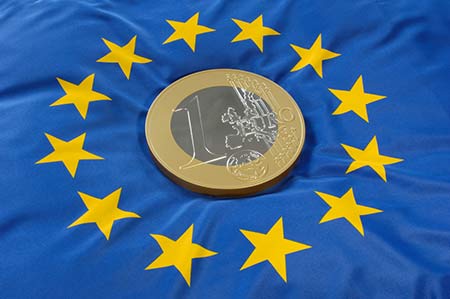The Euro to Pound Sterling (EUR/GBP) exchange rate weakened to a new 7-year low on Thursday after the European Central Bank (ECB) announced that its €1.1 trillion bond-buying programme would begin on March 9.
The Euro to Pound Sterling (EUR/GBP) exchange rate hit a session low of 0.7222
ECB policy makers left interest rates unchanged at the record low level of 0.05%.
‘We will on 9 March 2015 start purchasing Euro-dominated public sector securities in the secondary market. We will also continue to purchase asset-backed securities and covered bonds, which we started last year. Looking ahead, we expect the economic recovery to broaden and strengthen gradually. ’ said ECB President Mario Draghi.
The announcement comes as the Eurozone begins to show signs of improvement as major consumption and leading indicators beat forecasts since the ECB unveiled its plans for the QE programme on January 22nd.
The central bank also hiked its growth forecasts. It now expects the Eurozone economy to expand by 1.5% in 2015, up from its December prediction of 1%. In 2016, it expects GDP to rise by 1.5% from 1.3%.
In the press conference that followed the rate announcement concerns over Greece were heightened as Draghi said that the bank has not changed its mind on reinstating the waiver for sovereign Greek debt for refinancing operations.
Pound Sterling Rises on Improved Rate Hike Odds
The Pound Sterling advanced against the Euro after the Bank of England policy meeting. Policy makers left interest rates unchanged at 0.5%, but an improving economy suggests that interest rates are unexpected to rise at some point over the next year.
‘The MPC’s decision to stand pat toady…looks set to be repeated over the next few months while inflation hovers near zero. But by the summer, it should be clear that the UK’s deflation is neither pernicious nor long-lasting,’ said Samuel Tombs, economist at Capital Economics.
Monetary Policy Committee members Kristin Forbes and Martin Weale have both stated that rates could rise in the near future if inflation shoots up from current low levels.
The Euro could claw back some lost ground on Friday if upcoming German Industrial Production data comes in positively. Also due for publication will be Eurozone GDP data which is forecast to show that the economy expanded by 0.3%. On an annual basis, the economy is expected to have expanded by 0.9%.



